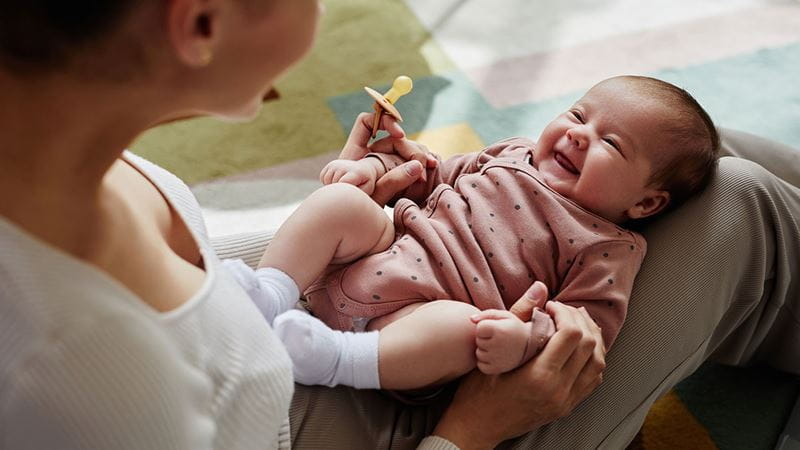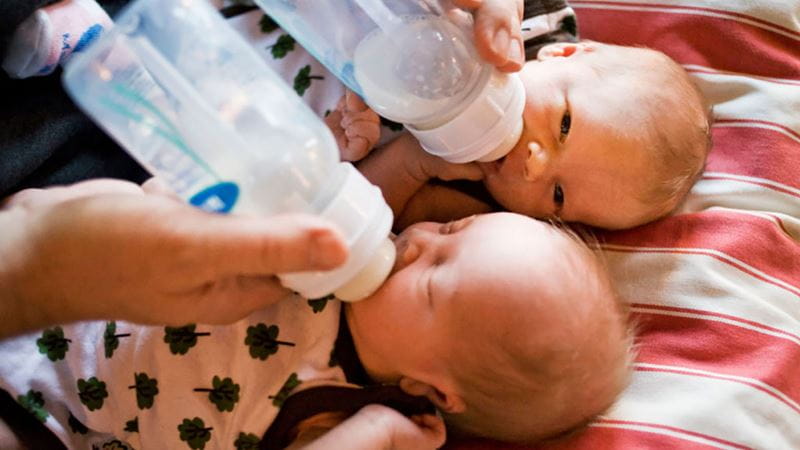Blog article
Understanding your baby’s cues: Feeding and sleeping

From the moment they’re born, babies use body language, facial expressions, and sounds to tell you what they need – whether it’s food, comfort, rest or play.
Learning to recognise and respond to these cues can help you feel more confident and connected as a parent. In this blog, we’ll explain the different types of baby cues, what they might mean, and how to tell the difference between hunger and tiredness – two cues that are often easily confused.
What are baby cues?
Before babies can speak, they’re already communicating with you. They use movements, facial expressions, and sounds to ‘talk’ to you, helping you understand how they feel and what they need. These are called baby cues. Most cues fall into two broad categories:1
- Engagement cues: Signs your baby is interested, relaxed, and ready to interact – like looking at your face, making sucking movements, or moving their arms and legs smoothly.
- Disengagement cues: Signs your baby is overwhelmed or needs a break – like turning away, fussing, yawning, or going limp or stiff.
Your baby’s cues can also be affected by things like noise, tiredness, and their physical comfort. It might feel like learning a different language at first, but with time and observation, you’ll start to learn what your baby is telling you – and how best to respond.
What are baby feeding cues?
Crying is often seen as a sign that your baby is hungry – but by the time they’re crying, they’re already quite distressed. In fact, babies show many earlier signs that they’re ready to feed, often well before the tears begin. Early feeding cues can include:2,3
- Turning their head from side to side (also known as rooting)
- Opening their mouth or making sucking sounds
- Sucking on hands, fingers, or fists
- Bringing their hands to their mouth
- Becoming more alert, fidgety or restless
- Making cooing or sighing noises
These signals are your baby’s way of saying “I’m ready for a feed.” If you respond at this stage, while your baby is still calm and alert, they’re more likely to feed well, whether by breast or bottle. If these cues are missed, your baby’s signals may escalate. They might start waving their arms or legs in a jerky way, become red in the face, or begin to cry. Once they’re this upset, it can be harder for them to settle and feed, especially if breastfeeding, as attachment may be more difficult and potentially uncomfortable.2
Watching your baby instead of the clock is one of the best ways to establish a feeding rhythm that works for both of you.
What are baby sleep cues?
Your baby can’t tell you they’re tired – but they can show you. Picking up on these signs before they become overtired can make a big difference to how easily they fall asleep. Unfortunately, tired cues can be pretty subtle. You might notice your baby:3
- Staring into the distance
- Slowing down or seeming less engaged
- Yawning, rubbing their eyes, or clenching their fists
- Becoming fussy or harder to soothe
- Losing interest in people, toys or surroundings
- Making jerky or restless arm and leg movements
Some babies will show several of these signs at once, while others have a pattern you’ll begin to recognise with time. Once your baby is overtired, settling can become more difficult – even for them. You can try calming techniques like swaddling, holding them close, using white noise, or gently rocking to help them wind down. A quiet, dark space can also reduce stimulation and give them a better chance of settling to sleep.3
Spotting tired cues early helps avoid the cycle of short feeds and short naps, and can make rest time easier for everyone.
Why is my baby showing hunger cues after feeding?
It’s common for babies to seem hungry even shortly after a feed. In some cases, they might be going through a growth spurt, cluster feeding, or simply seeking comfort through sucking.4
It’s also possible that what looks like hunger is something else entirely – like tiredness, overstimulation, or the need to self-soothe. Many tired cues (such as sucking on hands or rooting) overlap with hunger cues. If your baby has recently fed and turns away from the breast or bottle, try settling them first. They might just need a cuddle, a nap, or a change of scene.2
Tips for reading your baby’s cues
- Look at the whole baby: It may seem obvious, but it’s easy to focus on one part of your baby and neglect another. Remember to watch your baby’s body, face and sounds together, rather than just one cue on its own.
- Trust your instincts: As we mentioned earlier – while it will seem overwhelming at first, you’ll learn to tell the difference between their hungry cry and their tired cry over time.
- Respond early: Catching early hunger or tiredness cues can make feeding and settling smoother. As a new parent, you’ll need all the sleep you can get!
When to seek support
All babies have fussy periods – especially in the first three months. But if you’re unsure about your baby’s cues or feeding, or if they seem unsettled more often than not, speak to your GP or child health nurse.
For extra support, you can call Pregnancy, Birth and Baby, a national Australian Government service, on 1800 882 436 or use their video call service to speak directly with a maternal child health nurse. This free service is available 7 days a week, from 7am to midnight (AET). You can also call the Healthdirect helpline on 1800 022 222, available 24/7.
Sources:
1 The Royal Children’s Hospital Melbourne - Cues
2 Australian Breastfeeding Association - Feeding cues
3 Raising Children - Baby cues and baby body language
4 Parents - Why Is My Baby Always Hungry?
This article contains general information only and does not take into account the health, personal situation or needs of any person. In conjunction with your GP or treating health care professional, please consider whether the information is suitable for you and your personal circumstances.


